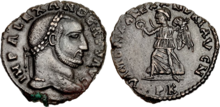Lucius Domitius Alexander (died c. 310), probably born in Phrygia, was vicarius of Africa when Emperor Maxentius ordered him to send his son as hostage to Rome. Alexander refused and proclaimed himself emperor in 308.[1]
| Domitius Alexander | |||||||||
|---|---|---|---|---|---|---|---|---|---|
| Usurper of the Roman Empire | |||||||||
 | |||||||||
| Reign | 308–310 (against Maxentius) | ||||||||
| Born | Phrygia (now Central Anatolia, Turkey) | ||||||||
| Died | c. 310 Africa | ||||||||
| |||||||||
The most detailed if somewhat confusing description of the insurrection is given by Zosimus (II, 12 and 14). He reports that Maxentius sent his portrait to Africa to gain recognition as Emperor there. The troops resisted because of their loyalty to Galerius. Maxentius ordered Domitius Alexander, the vicar of Africa, to send his son to Rome to secure his loyalty. Alexander refused and was crowned Emperor by his army. The incident was probably caused by the conflict between Maxentius and his father Maximian in April 308, and Zosimos confused Galerius with Maximian in his account.[2]
Apart from the provinces in north Africa (today's Algeria, Tunisia and western Libya), Domitius Alexander also controlled Sardinia. At the time of his accession, he was already at an advanced age. There is evidence in an inscription (CIL viii, 22183) that Alexander and Constantine I allied themselves in opposition to Maxentius. Salama suggests that, at the latest, the pact was entered into by autumn of 310.[3]
Maxentius sent his praetorian prefect Rufius Volusianus and a certain Zenas to quell the rebellion, and Alexander was taken prisoner and then executed by strangulation.[1] Apparently, his troops did not offer much resistance. Maxentius retaliated with confiscations of the property of alleged supporters of Alexander. The year of the end of Alexander's reign is subject to debate, although it was certainly in either late 309 or early 310.[4]
Notes
editReferences
edit- Barnes, Timothy D. (1982). The New Empire of Diocletian and Constantine. Cambridge, MA: Harvard University Press. pp. 14–15. doi:10.4159/harvard.9780674280670. ISBN 0-674-28066-0.
- Jones, A.H.M.; J.R. Martindale; J. Morris (1971). "L. Domitius Alexander". Prosopography of the Later Roman Empire. Vol. 1. Cambridge: Cambridge University Press. p. 43. ISBN 0-521-07233-6.
- Paschoud, Francois (2000), Zosime: Histoire Nouvelle. Paris, p. 213ff.
- Salama, P. (1973). "Recherches numismatiques sur l’usurpateur africain L. Domitius Alexander". Actes du VIIIe Congres international de numismatique, pp. 365 note 2.
- Smith, William (1867). "Alexander". In William Smith (ed.). Dictionary of Greek and Roman Biography and Mythology. Vol. 1. Boston: Little, Brown and Company. p. 126.
Further reading
edit- Angeletti, Ferdinando (2014). "L'insurrezione di Lucio Domizio Alessandro (308 – 310 d.C.). Storia della prima insurrezione d'Africa". Storia del Mondo. 11 (75): 195–202. ISSN 1721-0216. PMID 1721.
- Cases, Laurent J. (2019-05-26). "Society and Civil War in Africa During the Tetrarchy: The Rebellion of Lucius Domitius Alexander (308–310 CE)". Journal of Ancient History. 7 (1): 233–250. doi:10.1515/jah-2018-0017. ISSN 2324-8114.
- Wełna, Kamil (2019). "Uzurpacja Lucjusza Domicjusza Aleksandra 308–311 r. n.e. a polityczne i militarne znaczenie prowincji afrykańskich Cesarstwa Rzymskiego" [The usurpation of Lucius Domitius Alexander 308–310/311 AD and the political and military importance of the African provinces of Imperium Romanum]. Studia Antiquitatis et Medii Aevi Incohantis (4): 45–73. doi:10.34616/s.2019.4.45.73 (inactive 1 November 2024).
{{cite journal}}: CS1 maint: DOI inactive as of November 2024 (link) - Kluczek, Agata Aleksandra (2019-12-23). "On Alexander, Who in Carthage 'Had Foolishly Usurped the Supreme Power' Under Roma's Sign. Guillaume Malingue, The Coinage of Domitius Alexander (308–310 AD)". Res Historica. 48: 293. doi:10.17951/rh.2019.48.293-306. ISSN 2082-6060.
External links
edit- DiMaio, Michael. "L. Domitius Alexander (308-309 A.D.)". De Imperatoribus Romanis. Archived from the original on 2022-03-19.